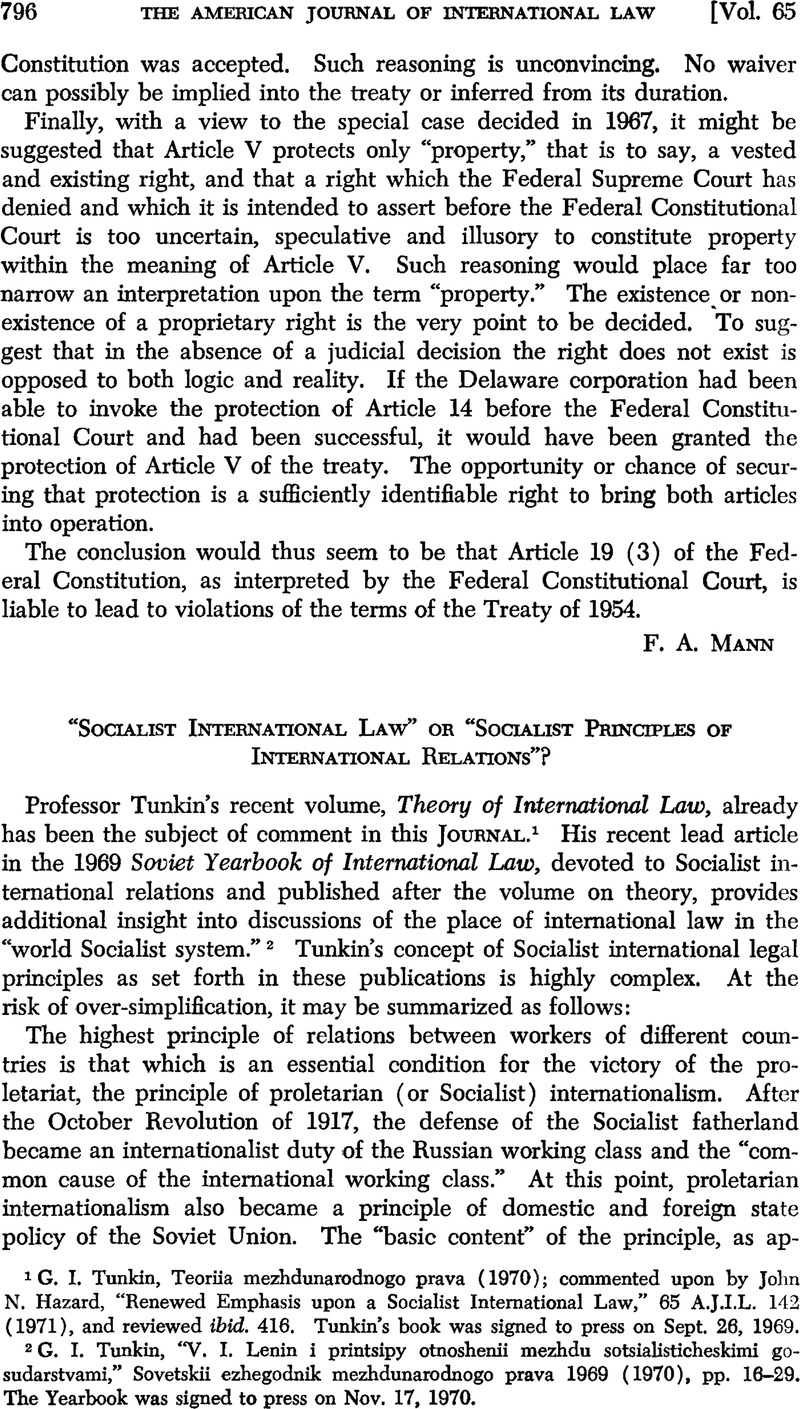No CrossRef data available.
Published online by Cambridge University Press: 28 March 2017

1 G. I. Tunkin, Teoriia mezhdunarodnogo prava (1970); commented upon by John N. Hazard, “Renewed Emphasis upon a Socialist International Law,” 65 A.J.I.L. 142 (1971), and reviewed ibid.416. Tunkin's book was signed to press on Sept. 26, 1969.
2 G. I. Tunkin, “V. I. Lenin i printsipy otnoshenii mezhdu sotsialisticheskimi gosudarstvami,“ Sovetskii ezhegodnik mezhdunarodnogo prava 1969 (1970), pp. 16-29. The Yearbook was signed to press on Nov. 17, 1970.
3 Cautioning against “poisonous nationalism,” Tunkin writes: “The events of 1968 in Czechoslovakia have shown how dangerous for the cause of socialism can be manifestations of nationalism in conditions of the activization of anti-socialist forces in a country together with the active support of imperialist reaction.” Ibid.25.
4 Ibid.
5 Ibid.27.
6 Ibid.28. The “subjects” of proletarian internationalism in its legal aspect are left open, except for the exclusion of China. The Communist-Party states of Eastern Europe obviously are included, but the status of Yugoslavia, Mongolia, North Korea, North Viet-Nam, Cuba, and perhaps Albania is unclear. However, the doctrine of Socialist internationalism would not appear to be applicable to non-Communist-Party states.
7 Ibid.In the volume on theory, this point was not made so carefully: “The principles of proletarian internationalism and other socialist norms arising in relations between countries of the socialist camp are international legal principles and norms of a new, higher type of international law—a socialist international law—the fundamental principles of which are being formed in relations among states of the socialist system and which are going to replace contemporary general international law.“ Tunkin, Teoriia mezhdunarodnogo prava 503.
8 Tunldn, loc. cit.note 2, p. 28. There is presently much emphasis in Soviet media upon Socialist integration, but Tunkin's formulation of jus cogensseems to contemplate a body of local norms among states and not, at least at this stage, norms of a municipal character within a federation.
9 1 V. M. Chkhikvadze et al.(eds.), Kurs mezhdunarodnogo prava v shesti tomakh 23 (1967).
10 L. A. Aleksidze, “Problema jus cogens v sovremennom mezhdunarodnom prave,“ Sovetskii ezhegodnik mezhdunarodnogo prava 1969 (1970), p. 144.
11 On June 24, 1970, the Department of the Theory and History of State and Law and the Department of International Law of the Law Faculty of Leningrad University held a joint meeting to discuss Tunkin's Teoriia mezhdunarodnogo prava, the author himself being present. Most of the reported criticisms and comments related to general international law, but it is clear that Tunkin also was faulted for devoting insufBcient attention to the international legal relations of Socialist states. Taking Tunkin's side on this point, Professor Bobrov noted that two chapters of the book, “replete with the necessary materials,” were devoted to the question, but Tunkin's approach or views were not expressly endorsed. See V. L. Iushchenko, “Obsuzhdenie problem teorii mezhdunarodnogo prava,” Pravovedenie, No. 6 (1970), pp. 132-134.